Community member provides hope for Ukrainian refugees
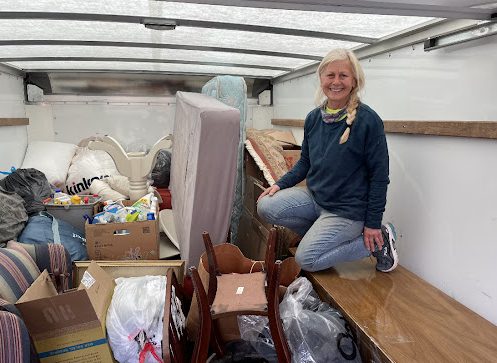
Photo courtesy of Irene Mosias
Irene Mosias has helped around 80 Ukrainian refugee families furnish their new homes in just a few short months. Although tiring and sometimes tedious, Mosias says she feels that what she is doing is a “calling.”
October 26, 2022
Irene Mosias’ story starts at a Ukrainian school in Pennsylvania. Her parents were born and raised in Ukraine, eventually migrating to the United States after World War Two. It is common for Ukrainian parents to send their young children to Ukrainian school during the night, where they learn language, history, and reading skills. Although a prevalent aspect of her routine as a child, Mosias despised it.
“I was ashamed and embarrassed to go to Ukrainian school; I hated it,” said Mosias. “I didn’t want to be Ukrainian. I didn’t want people to meet my parents because they didn’t speak English.”
Her mother repeatedly reassured her that the language would “come in handy” someday. Mosias didn’t understand at the time, in fact, she didn’t use the language for nearly 50 years. However, her mother’s predictions would prove to be true when the language weaved its way into her life again to serve her in a way she never expected.
Mosias, now retired from her job in human resources, currently lives in Palatine, Illinois. Here, she volunteers nearly 30 hours a week at food pantries in order to feed the homeless in her town. On top of this, she spends around 40 hours a week helping Ukrainian refugees secure furnishings for their new lives here in America.
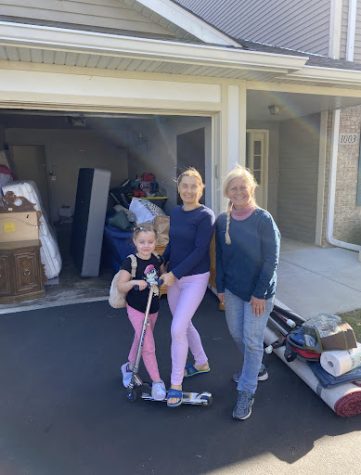
Photo courtesy of Irene Mosias
A fierce political conflict broke out in February when Russia invaded Ukraine. Violent attacks targeted directly at Ukraine have escalated significantly in the past eight months, leading to the mass destruction of Ukrainian cities such as Kyiv. What was once a lively capital city now consists of rubble, debris, and missiles.
More than 7 million Ukrainians fled to countries worldwide in order to escape their war-ridden home. There are currently 20,000 Ukrainian refugees living in the Chicago area.
When these refugees arrive here, they often only have the items they can carry or wear. Possibly a small suitcase – that’s it.
Mosias hopes to change this reality.
Early in 2022, Mosias, along with a few coworkers, opened a store she named “Support Ukranians in Chicagoland” in Riverwoods, Illinois. The property owner was willing to give Mosias the space for free to support her cause. In this building, Ukrainian refugees came and could pick up things that they needed for free, much like a “Goodwill” store.
Miraculously, Mosias’ Ukrainian language, which she learned as a young child, resurfaced.
“When the store in Riverwoods was open, I would be there about four days a week, so I was surrounded by Ukranian folks and immersed in the language,” said Mosias. “In a matter of months, the language skills that were in cobwebs for decades came back to me.”
She has found these skills incredibly useful to assist and connect with new Ukrainian refugees, who often know only one or two sentences of English when they arrive. Mosias is able to support these refugees by facilitating donations to the families that need them.
The property, after five months, stopped offering the space for free, leading to the closure of the store’s location. Nonetheless, Mosias was determined to prolong the cause.
“I was insistent on finding another way to support them,” said Mosias.
She took some of the inventory, that otherwise would have been thrown away, and posted it on her Facebook page named “Support Ukranians In Chicagoland.” Ukrainian refugees can view this Facebook page and connect with a site administrator who gives them Mosias’ name and contact information.
When this operation began, Mosias kept the donated goods in her home garage. Useful household items that people may have outgrown, such as old mattresses, silverware, furniture, clothing, and children’s toys began to overflow the space. These items are incredibly useful to refugees, who come to America with little-to-no personal belongings.
“Many of them don’t even have a spoon. A blanket. A sleeping bag,” said Mosias.
Mosias noticed that many Chicagoans have belongings in their house that they simply do not use anymore that could be significantly useful to the refugees.
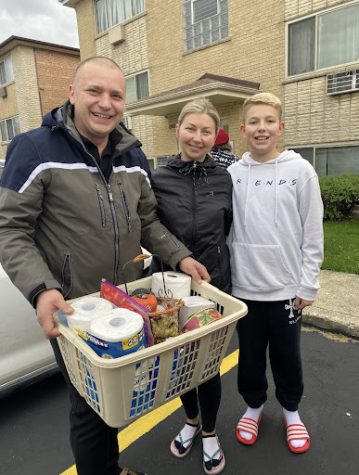
Photo Courtesy of Irene Mosias
“A quick pass through the basement and I had three lamps, several throw pillows, a bulletin board, backpacks, frames, and around ten coats,” said Lake Forest resident Carolyn DeLuca. “All of them were just sitting around taking up space, and I was thrilled to give them to Irene knowing they would make such a difference for these families.”
Knowledge of the operation quickly spread throughout the community, through Facebook and by word of mouth. People in Lake Forest/Lake Bluff were more than willing to contribute to the cause.
“Living in a community like Lake Forest is very insulated and we do not always remember how fortunate we are,” said Lake Forest resident Michelle Uhart. “It is so nice to be able to pass things on to those who can use them, especially when we have so many things just taking up space in our home.”
With an overwhelming amount of donations from the North Shore, the operation expanded. However, the space in Mosias’ garage quickly diminished. She proceeded to rent a storage unit where Ukrainian refugees can come “shop for free.” Selflessly, she pays for the storage unit and even rents trucks to deliver larger furniture to people’s new homes, all on her own penny.
“The fact that Irene will drive locally to fill up a truck and is also available in several locations makes donating very easy,” said DeLuca. “It just makes you feel good to know that you are helping someone, even if it’s just with stuff I found in my basement.”
Mosias works to make sure these refugees have everything they need for an easy transition to their new homes. She notes that beds are consistently a top priority, followed by tables and chairs. She drives these rented trucks herself, traveling all around the Chicago area picking up donations and then passing them onto refugees.
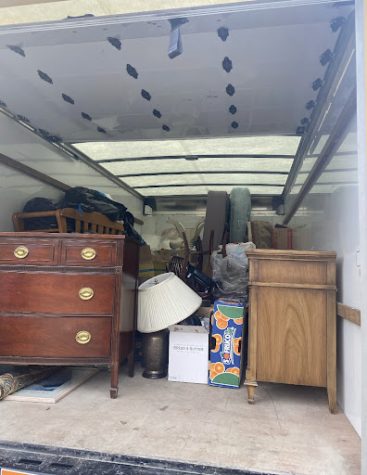
Photo. Courtesy of Irene Mosias.
Mosias has helped around 80 families furnish their new homes in just a few short months. Although tiring and sometimes tedious, Mosias said she truly feels that what she is doing is a “calling.”
“All of the things that I’ve done in the past 50 years of my life, from going to Ukrainian school, to working in Human Resources, even the mistakes I’ve made through the years have all come together in a way so that I can be effective at what I am currently doing,” said Mosias. “If I didn’t have a passion for what I am doing, none of this would be possible. It takes a certain amount of discipline, passion, and determination.”
One of the many beautiful things about Mosias’ work is the visible impacts on the families she assists. Many of the refugees are amazed by the empathy and compassion they receive as they transition into a brand new country.
“Many of them burst into tears and are overwhelmed by the generosity of the American people,” said Mosias. “The fact that we don’t even know them and are gifting them with furniture and things for their house, they are speechless and in tears at the generosity and compassion.”
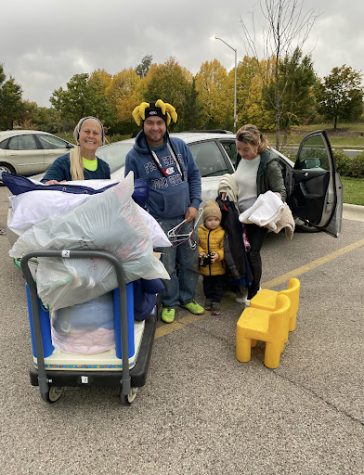
Photo courtesy of Irene Mosias.
The little Ukrainian school, which Mosias was initially ashamed of, ended up being one of the most influential aspects of her life. The skills she gathered have allowed her to connect with and support refugees in one of the most terrifying and difficult times of their lives.
Mosias, along with outpouring support from her friends, neighbors and the community, have made a significant difference in the lives of so many Ukrainian families. Through her considerate efforts, Mosias has helped refugees turn despair into hope, turn uncertainty to belief, and most importantly, turn a house into a home.








